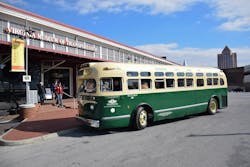Bus Dedicated to Margie Jumper, Roanoke Civil Rights Hero
On a Sunday afternoon in 1946, Margie Jumper, an African American housekeeper working in an all-white neighborhood, boarded a crowded —‑ and segregated —Roanoke streetcar to go home.
The streetcar was crowded. White passengers sat in the middle and front of the trolley. African American passengers sat in the back. If there was no room to sit, the African American passengers stood. In that day and age, Mrs. Jumper was not allowed to sit where she wanted.
Jumper sat in the reserved-for-white-passengers middle seats. She went unnoticed for a few miles, and in the heart of downtown Roanoke, in front of City Hall, the conductor stopped the trolley and ordered Jumper to leave her seat.
She refused.
The police were called and removed her from the trolley. She refused to reveal her identity. She hired a lawyer, an African American, who advised her to plead guilty and pay a fine.
It wasn’t until nine years later when another African American woman, Rosa Parks, refused to give up her seat on a bus in Montgomery, Alabama, that sparked the movement that ended unfair segregation throughout the South.
While her arrest didn’t spark a national outcry, Mrs. Jumper’s refusal to give up her seat prompted a discussion on segregation and racial inequality throughout the Roanoke Valley.
It was this reason that the Commonwealth Coach and Trolley Museum Inc., a partner of the Virginia Museum of Transportation Inc., dedicated the 1958 GMC TDH 3714 Roanoke City Bus 102 — a bus that was in service when Roanoke City integrated public transit in 1963 — in her honor.
“We wanted to honor Mrs. Jumper and her fight against racial inequality,” said Beverly T. Fitzpatrick, Jr., president of the Commonwealth Coach and Trolley Museum in Roanoke, Virginia. “By dedicating the bus — and reserving the best seats in front of the bus — in honor of this local hero, we hope it serves as a reminder of the negative effects of racial inequality and how ordinary citizens can spark important change.”
The Commonwealth Coach and Trolley Museum Inc., is a non-profit that educates Virginians about the history, use and efficiency of public transit and provides low-cost group transportation to area non-profit organizations and public events.The CCTM’s collection has almost 30 vintage buses and trolleys that served the public through transit throughout the Commonwealth of Virginia — from a 1934 Dodge Brothers Bus to a 1998 New Flyer Coach from Blacksburg, Virginia.
“We feel that public transit tells part of our history,” Fitzpatrick said. “Transportation — like almost everything — was segregated throughout the South. Honoring those who fought against segregation are true American heroes.”
Fitzpatrick said that Mrs. Jumper continued to fight for the rights of African Americans in Roanoke. “She was fair to people of all races, a great friend and activist for her neighbors, and a powerful mentor to local children,” he said.
Jumper served on the executive committee for the Roanoke NAACP. In the 1980s, she voiced her concerns about apartheid in South Africa. In 2003, Margie Jumper received the Reverend R.R. Wilkinson Memorial Award in Social Justice. Jumper passed away at age 92.
